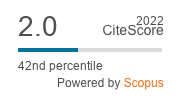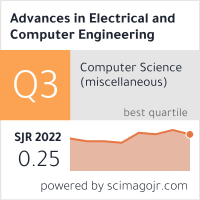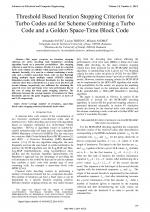| 1/2014 - 21 | View TOC | « Previous Article | Next Article » |
Threshold Based Iteration Stopping Criterion for Turbo Codes and for Scheme Combining a Turbo Code and a Golden Space-Time Block CodeSAVIN, A. |
| View the paper record and citations in |
| Click to see author's profile in |
| Download PDF |
Author keywords
average number of iterations, space-time block codes, stopping criterion, threshold, turbo codes
References keywords
turbo(15), decoding(13), stopping(11), codes(8), communications(7), letters(6), criterion(6), iterative(5), soft(4), isscs(4)
Blue keywords are present in both the references section and the paper title.
About this article
Date of Publication: 2014-02-28
Volume 14, Issue 1, Year 2014, On page(s): 139 - 142
ISSN: 1582-7445, e-ISSN: 1844-7600
Digital Object Identifier: 10.4316/AECE.2014.01021
Web of Science Accession Number: 000332062300021
SCOPUS ID: 84894607425
Abstract
This paper proposes an iteration stopping criterion for turbo decoding with Benedetto's decoding algorithm based on a posteriori probabilities. This stopping criterion is used in two schemes. Firstly, it is used in a classical turbo code scheme on additive white gaussian noise (AWGN) channel. Secondly, it is used in a scheme combining a turbo code and a Golden space-time block code on fast Rayleigh fading multiple input multiple output (MIMO) channel. Simulation results with different thresholds for the stopping criterion show that a threshold of 1.2 and 1.4 in the first and second scheme, respectively, are sufficient for obtaining the same bit error rate and frame error rate performance like in the case of using the ideal genie stopping criterion. The difference between the average number of iterations for these thresholds and for the genie stopping criterion is at most 1.5 and 1.25, respectively. |
| References | | | Cited By |
Web of Science® Times Cited: 5 [View]
View record in Web of Science® [View]
View Related Records® [View]
Updated today
SCOPUS® Times Cited: 6
View record in SCOPUS® [Free preview]
View citations in SCOPUS® [Free preview]
[1] Sum-Log Stopping Criterion for Log-MAP Turbo Decoding, OUARDI, A., Advances in Electrical and Computer Engineering, ISSN 1582-7445, Issue 1, Volume 23, 2023.
Digital Object Identifier: 10.4316/AECE.2023.01005 [CrossRef] [Full text]
[2] Threshold-Based Bit Error Rate for Stopping Iterative Turbo Decoding in a Varying SNR Environment, Mohamad, Roslina, Harun, Harlisya, Mokhtar, Makhfudzah, Adnan, Wan Azizun Wan, Dimyati, Kaharudin, Frequenz, ISSN 0016-1136, Issue 1-2, Volume 71, 2017.
Digital Object Identifier: 10.1515/freq-2016-0018 [CrossRef]
[3] Effect of interleaving on the performances of the MAP turbo decoder controlled by the IHDA and CE Stopping criteria, Ouardi, Aissa, Journal of Physics: Conference Series, ISSN 1742-6588, Issue 1, Volume 1812, 2021.
Digital Object Identifier: 10.1088/1742-6596/1812/1/012006 [CrossRef]
[4] Low Complexity Stopping Rule for Turbo Decoding: the Max-log Criterion, Ouardi, Aissa, Journal of Telecommunications and Information Technology, ISSN 1509-4553, Issue 2024, Volume 1, 2024.
Digital Object Identifier: 10.26636/jtit.2024.1.1377 [CrossRef]
[5] Threshold-based improved minimum descriptive length stopping criterion for iterative turbo decoding, Hafiz Zulkefle, Muhammad Iskandar, Mohamad, Roslina, Suliman, Saiful Izwan, Kassim, Murizah, Anas, Nuzli Mohamad, 2017 IEEE 13th Malaysia International Conference on Communications (MICC), ISBN 978-1-5386-3132-4, 2017.
Digital Object Identifier: 10.1109/MICC.2017.8311731 [CrossRef]
[6] On the robustness of measurement of reliability stopping criterion in turbo iterative decoding, Mohamad, Roslina, Harun, Harlisya, Mokhtar, Makhfudzah, Adnan, Wan Azizun Wan, Dimyati, Kaharudin, 2015 IEEE/ACIS 16th International Conference on Software Engineering, Artificial Intelligence, Networking and Parallel/Distributed Computing (SNPD), ISBN 978-1-4799-8676-7, 2015.
Digital Object Identifier: 10.1109/SNPD.2015.7176188 [CrossRef]
Disclaimer: All information displayed above was retrieved by using remote connections to respective databases. For the best user experience, we update all data by using background processes, and use caches in order to reduce the load on the servers we retrieve the information from. As we have no control on the availability of the database servers and sometimes the Internet connectivity may be affected, we do not guarantee the information is correct or complete. For the most accurate data, please always consult the database sites directly. Some external links require authentication or an institutional subscription.
Web of Science® is a registered trademark of Clarivate Analytics, Scopus® is a registered trademark of Elsevier B.V., other product names, company names, brand names, trademarks and logos are the property of their respective owners.
Faculty of Electrical Engineering and Computer Science
Stefan cel Mare University of Suceava, Romania
All rights reserved: Advances in Electrical and Computer Engineering is a registered trademark of the Stefan cel Mare University of Suceava. No part of this publication may be reproduced, stored in a retrieval system, photocopied, recorded or archived, without the written permission from the Editor. When authors submit their papers for publication, they agree that the copyright for their article be transferred to the Faculty of Electrical Engineering and Computer Science, Stefan cel Mare University of Suceava, Romania, if and only if the articles are accepted for publication. The copyright covers the exclusive rights to reproduce and distribute the article, including reprints and translations.
Permission for other use: The copyright owner's consent does not extend to copying for general distribution, for promotion, for creating new works, or for resale. Specific written permission must be obtained from the Editor for such copying. Direct linking to files hosted on this website is strictly prohibited.
Disclaimer: Whilst every effort is made by the publishers and editorial board to see that no inaccurate or misleading data, opinions or statements appear in this journal, they wish to make it clear that all information and opinions formulated in the articles, as well as linguistic accuracy, are the sole responsibility of the author.





